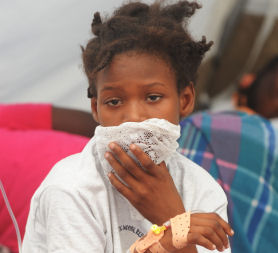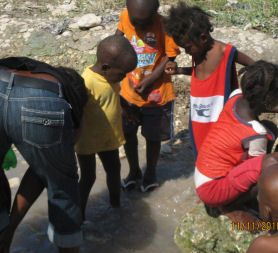Haiti cholera: the importance of education
More than a week after Hurricane Tomas swept through Haiti an international aid worker tells Channel 4 News the battle against cholera remains as urgent as ever.

Health experts say the cholera epidemic in Haiti could infect up to 270,000 people within a year. Writing for Channel 4 News Oxfam’s Julie Schindall, who is based in Haiti, says education is vital in the fight against cholera.
As Hurricane Tomas left Haiti behind, we all breathed a huge sigh of relief. Although the storm caused some damage, it wasn’t nearly as bad as expected.
However, our staff knew, after decades of working in cholera epidemics around the world, that we hadn’t actually escaped a disaster from the storm. As the floodwaters receded, the cholera outbreak that started in central Haiti in late October began its vicious spread.
This storm created the perfect conditions for cholera. Raphael Mutiku, Oxfam
Since the Haiti earthquake in January, Oxfam has been providing clean water, latrines and hygiene education to 315,000 people in the capital city, Port-au-Prince.
Three weeks ago, we launched an emergency cholera response for 100,000 people in central Haiti, where the outbreak began. Our staff of 700 are now working around the clock to protect nearly half a million people from cholera. But the fresh rainwater provided the perfect environment for millions of deadly bacteria to multiply.
“Now we must act very quickly. This storm created the perfect conditions for cholera,” said Raphael Mutiku, Oxfam water and sanitation advisor.

New cases of cholera
From all over the country, reports from our colleagues flow in daily to our central office in Port-au-Prince.
First thing in the morning, our cholera response manager in central Haiti reports they’ve distributed over 17,000 hygiene kits to nearly 50 villages. An hour later, we receive confirmation that we’ll build six latrines for a new cholera treatment centre in Petit Goave, a small coastal west of Port-au-Prince.
Then an urgent call comes from Cap Haitien, the second largest city in Haiti and a northern port.
We’ve been working with local authorities for years in Cap Haitien to build a water and sanitation infrastructure. They say they have hundreds of cases of people with cholera and are in desperate need of clean water and public health educators. Within 24 hours, we dispatch our third emergency team to assess the situation.
The first two emergency teams are already swamped, running water and sanitation programs in central Haiti, and keeping hundreds of thousands of people safe in camps in Port-au-Prince.
Educating against cholera
At the same time that our engineers dig freshwater wells in central Haiti, and our public health specialists distribute soap and check water quality in Port-au-Prince, we know that the most important work we do is educate people about the basic good hygiene practices that will keep them safe.
We can stop this disease with soap, chlorine and, most importantly, education. Julie Schindall, Oxfam
Cholera is an unknown disease in Haiti, and people are scared. People in camps ask us questions like if they can get cholera from kissing, or from a voodoo curse.
At Oxfam, we’ve dealt with this disease for decades, and on far larger scales, in places like Zimbabwe and Congo. We know that cholera is preventable and treatable. Stopping cholera isn’t so much about fancy medications or expensive machines. We can stop this disease with soap, chlorine and, most importantly, education.
At the Cité Maxo camp in Port-au-Prince, the leader of the camp, Mr. Martin, assures us the residents are staying vigilant about hand washing and drinking chlorine-treated water. On this sunny, rocky hillside in the Delmas neighbourhood, Oxfam provides clean water, soap, latrines, showers and hygiene education for 5,000 camp residents.
“We have plenty of clean water. We know what we have to do to stay safe. I’m not worried about cholera,” he assures us with a huge smile.
He rests his hands contentedly on his belly. “I know cholera. I know what to do,” he says.
With engaged and informed community leaders like Mr. Martin, we can stop the spread of cholera. The challenge now is to reach every last camp and village with clean water, sanitation facilities, and hygiene education.
-
Latest news
-
Tim Booth of the band James’ on agism in music, topping the charts and AI6m

-
As India goes to the polls in the world’s largest election – what do British-Indians think?6m

-
Tees Valley: Meet the candidates in one of the biggest contests coming up in May’s local elections4m

-
Keir Starmer says public sector reform will be a struggle7m

-
Nicola Sturgeon’s husband Peter Murrell charged with embezzlement of funds from SNP1m

-




